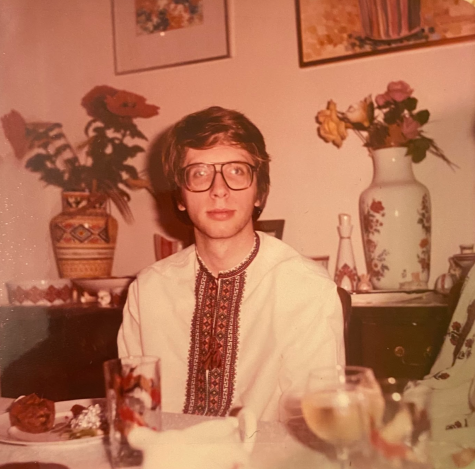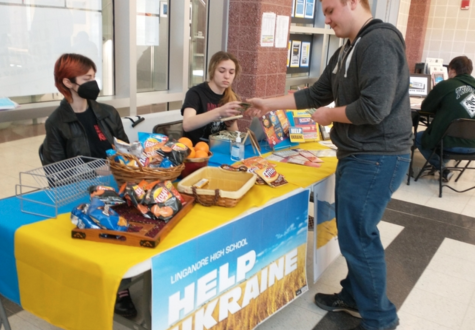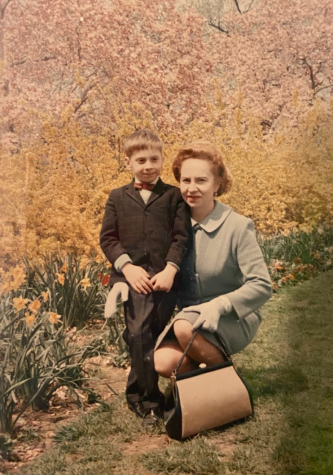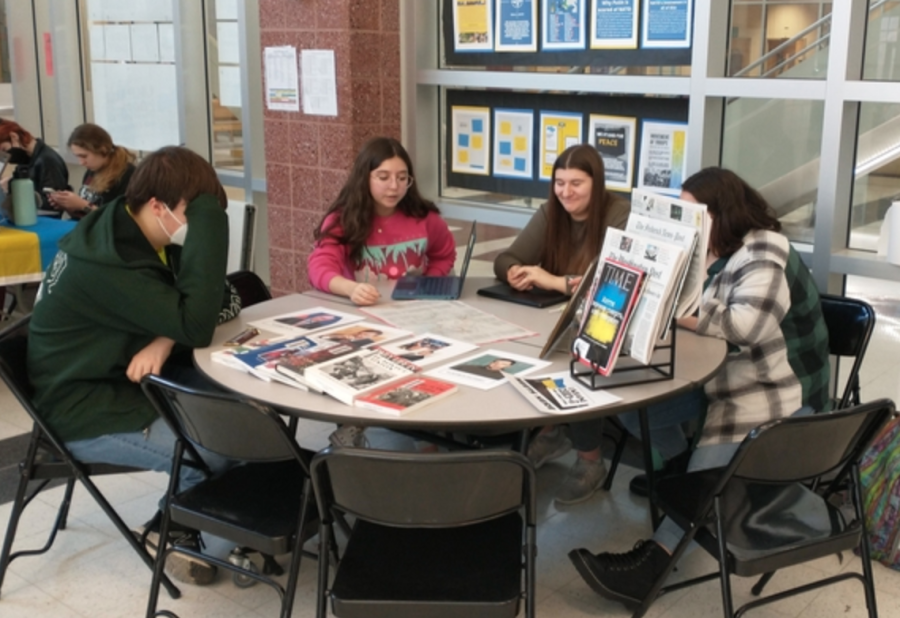Hope and heritage: Global Issues class makes connections with Ukraine
Daniela Gerardi, Taylor Gepes Carroll and Sophia Hopkins teach a student about the war in Ukraine.
April 29, 2022
Living in Frederick County, a suburban county in Maryland, I know virtually no one with any type of similar background as me.
My grandparents on my dad’s side are immigrants from Eastern Europe; my grandpa from the Czech Republic and my grandma from Ukraine. Knowing I was half Slavic was something I had always been proud of.
My dad, Igor Cerny, has taught me an appreciation for my heritage.
He said, “I grew up pretty immersed in the culture. [My family and I] went to Ukrainian church– Eastern Orthodox church. We had all kinds of Ukrainian tablecloths and dishes and things like that. The first language I spoke was Ukrainian. The Eastern Orthodox calendar that my mom followed was 13 days behind, so Christmas we would celebrate around January 4. I kind of got to have two Christmases– one American Christmas and the Eastern Orthodox Christmas.”
When I walked into the first day of National and Global Issue, I never expected this school class, my heritage, and the war in Ukraine to merge.
In National and Global Issues, as the world watched the Russian troop build-up, we began to study the history of Ukraine, back to the Euromaidan Revolution which started in 2014. From then, we slowly moved up to the current events which were quickly escalating.
In Feburary, the war broke out.
Instructor Darren Hornbeck said, “After studying the build-up and final escalation to war in Ukraine, I think all of us began to feel somewhat helpless. I wanted [the] National and Global Issues class to understand how they could make a difference with their actions.”
Hornbeck was right. Despite the distance between myself and Ukraine, the war was painful.
Everywhere on any social media platform, I was reminded of the war. It seemed like all social media accounts were posting yellow and blue flags. Not only that, but every day in National and Global Issues we learned more and more about the war. The further the war progressed, the more I felt helpless.

Senior Keifer Spore said, “I felt like there was almost nothing we could do because the news kept saying if the U.S. did one wrong thing it would end up in another world war.”
Hornbeck proposed to my class a way to raise money and awareness. He suggested our class sell snacks and candy at lunch with all proceeds going directly to a charity of our choice. He would pay for the snacks on his part, and we would do the rest.
The class was eager to help.
Hornbeck said, “We had sold products several years ago to help raise money for micro-loans to people in developing countries. It worked then, and I had a hunch it would work again.”
Hornbeck also suggested we do a teach-in, a form of social protests in which those protesting educate those on a pressing issue.
“People have had “teach-ins” for years. In the 50’s and 60’s people did them to educate people about the Civil Rights movement and the Vietnam war. In the 80’s we did them at my college campus to help people understand the dangers of nuclear weapons. It’s a very effective tool to fight problems in society,” said Hornbeck.
When it came to what charity to donate all the money to, Mr. Hornbeck gave us three different charities that could help Ukraine in some way. Our job as a class was to research each charity and vote on which one we preferred. We ultimately decided all profits would go to UNICEF. UNICEF mainly focuses on child refugees.
“I believe all the footage of innocent children fleeing Ukraine and the injuries inflicted on them played a large part in your class selecting a global charity focused on helping children,” said Hornbeck.

Immediately after choosing the charity, my class began organizing. Students who chose to do the teach-in worked to create a slideshow that could educate students about the war in Ukraine quickly and efficiently. The rest would create posters to put up that could also educate people, each group assigned with one topic ranging from Ukraine gaining its independence in 1992 to present day.
The fundraiser and teach-in lasted from March 16 through the 18 during lunch. Within that short 3-day period, we raised $674.
Junior Sofie Rodriguez said, “I felt relieved knowing that we were taking action and helping raise money, along with awareness, for the children in Ukraine.”
Senior Seth Berlew said, “It made me feel good that I could help in some way. I was so happy to be able to give, and help people and be able to educate people about what is happening so they could be able to help.”

I will admit, even after the money I helped to raise, I was still anxious. I think as long as this war continues, I will always be anxious. But, raising money and educating people gave me a sense of power that made me even more proud of my heritage.
“The invasion makes me feel sad, angry and helpless like I can’t do anything more about this. I would hear my mom and my dad talk about the Soviets… My parents before they knew each other, my dad was in Czechoslovakia and my mom was in Eastern Ukraine, they were under Nazi occupation at the time and then when the Russians began to come from the east. They both took trains into Germany to hopefully meet the Americans, the British and the French. They would rather go towards the Nazis than sit there and let the Russians take over,” said Cerny.
I also know that there are many more ways to help. I’ve done small gestures like put a blue and yellow pin on my backpack and fly the Ukrainian flag outside of my house. My father has done much to help, too. He’s bought things on Amazon and sent them to my Grandma’s old church, St. Andrew Ukrainian Orthodox Cathedral to be sent to Ukraine.
Cerny continues to search for meaningful ways to bridge the gap between his life today and his heritage.
Cerny said, “There’s a group called World Central Kitchen. They go around the world and go into areas that are stricken by poverty or war and they make meals. I have donated money to them because they have been making meals, not only in Ukraine, but at the Polish-Ukrainian border.”
I want people to know that Ukraine isn’t just a country far away with no real significance. To me and many people alike, Ukraine is a place of pride. As long as Ukrainians continue to fight for their freedom, I will be alongside them doing everything I can from where I am.
Where can you donate?
Sunflower of Peace– Sunflower of Peace is a non-profit organization that accepts donations of money or direct purchasing of medical supplies. Their goal is to provide medical aid to those affected by the war in Ukraine.
Ukrainian Red Cross– The Ukrainian Red Cross works directly in Ukraine, often providing shelter, food, supplies and aiding evacuation when needed.
Voices of Children– This charity helps children affected by the war by providing them with non-stop psychological support.
United Nations High Commissioner for Refugees– As many families flee Ukraine, UNHCR works to prepare and provide neighboring countries with the correct aid in order to help these refugees.
United Nations Population Fund– Women and girls are facing hardships when it comes to reproductive health in times of war. UNFPA tries to combat this by delivering supplies and resources that are essential to saving lives.



